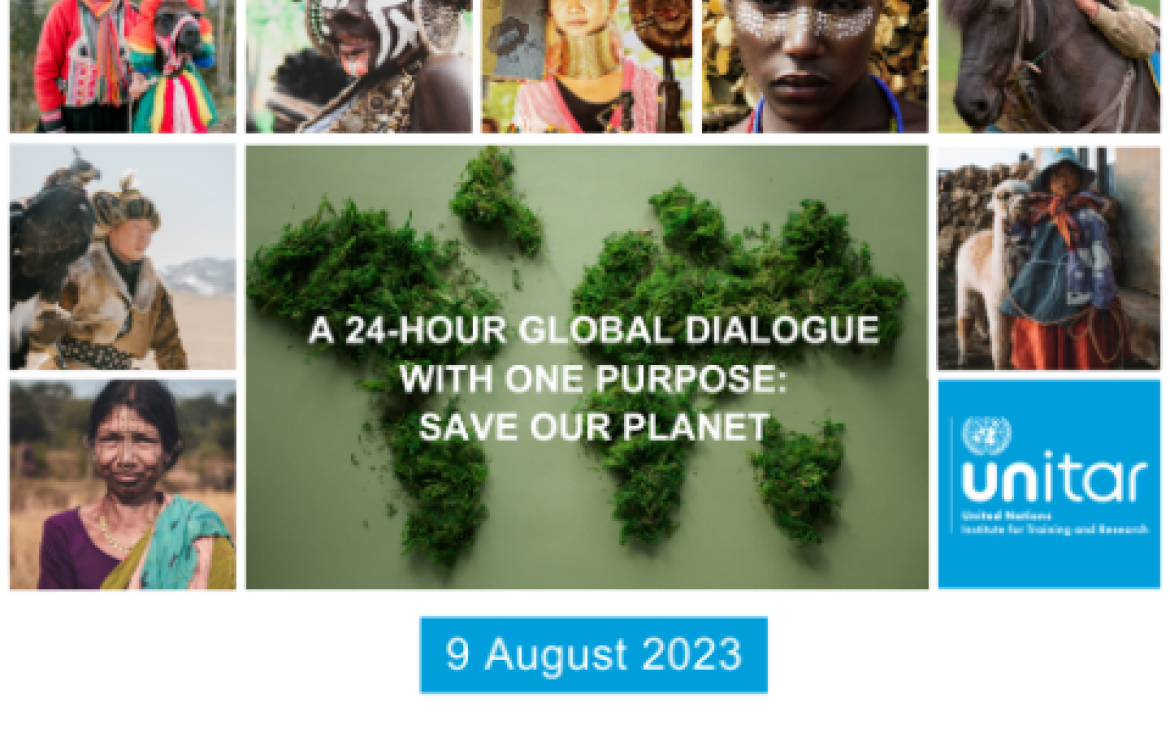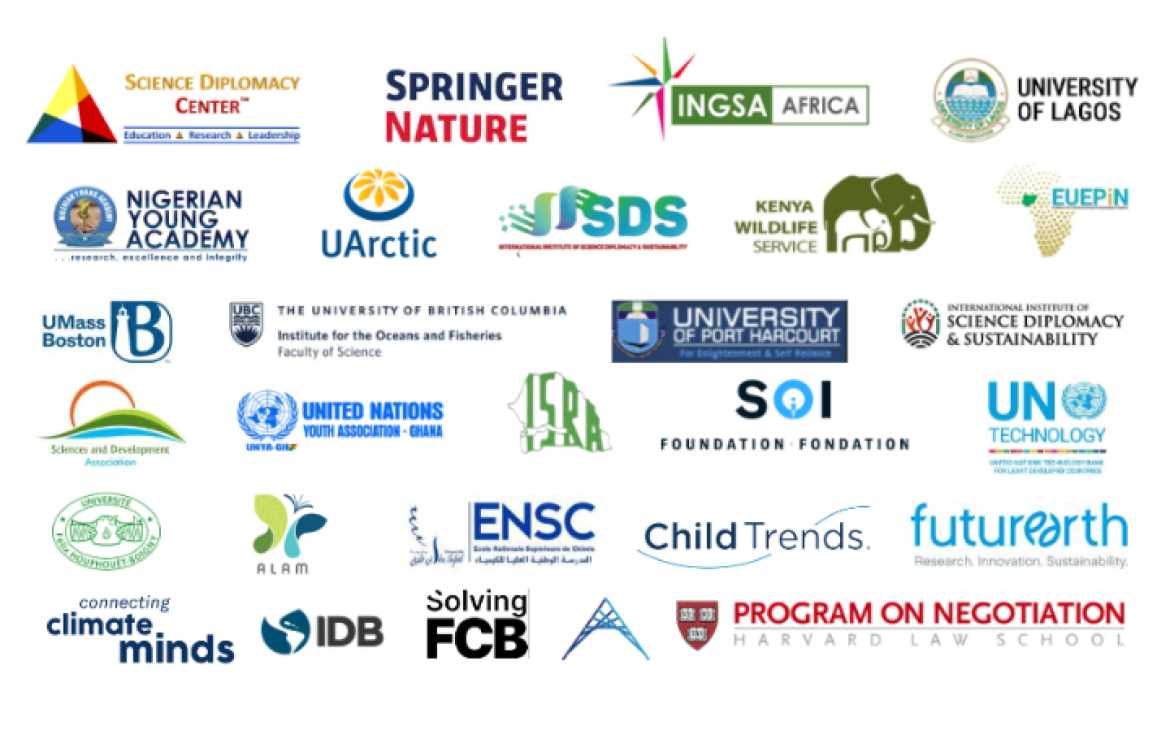Background
A global dialogue, developed by, for, and among Indigenous youth
The GLOBAL INDIGENOUS YOUTH SUMMIT ON CLIMATE CHANGE (GIYSCC) was being convened by, for and among Indigenous youth (in contrast to Elders), who participated in designing the agenda and invite the participants from three 8-hour time zones, in a 24-hour period, on 9th August 2023 (United Nations International Day of the World’s Indigenous Peoples). In a complementary context, the Summit preceded the United Nations International Youth Day on August 12th.
The 24-hour live stream can be accessed here.
To see the final event programme, please download the PDF on the homepage of the Science Diplomacy Center™ website.
To read the Nature commentary by the GIYSCC Indigenous Youth Leaders published on 4 August 2023, please click here: Indigenous Youth Must be at the Forefront of Climate Diplomacy.
There are more than 370 million Indigenous people in some 70 countries worldwide. Indigenous cultures and communities are precious intrinsically, but also as guides for all humanity with direct relevance for our sustainable development across generations on Earth. Since the 20th century, humanity has been learning to operate as a globally interconnected civilization, represented clearly by the “common concern of humankind” in our climate with its variability on a planetary scale across decades-to-centuries.
The breadth of challenges posed by climate change at local-to-global levels is a multilateral concern across the spectrum of subnational-national-international jurisdictions. At the same time, rapidly changing climatic conditions have increased levels of uncertainty and anxiety among the youth on Earth. Nonetheless, the unprecedented mobilization of youth around the world shows the massive power they possess as essential contributors to informed decisionmaking on planetary scale, which is symbolized by Earth’s climate. Youth and especially Indigenous youth have key roles to enhance multilateral cooperation on climate action, helping humanity to operate for the benefit of all on Earth across generations.
Indigenous youth leaders
Regional Leads:
- Name: Dr. Temitope O. Sogbanmu (GIYSCC Africa Lead)
Main/Principal Affiliation(s): University of Lagos (UNILAG) & Nigerian Young Academy (NYA)
Preferred Contact Email Address: tsogbanmu@unilag.edu.ng
- Name: Dr. Heather Sauyaq Jean Gordon (GIYSCC North America & Arctic Co-Lead)
Main/Principal Affiliation(s): Child Trends (Iñupiaq, Nome Eskimo Community)
Preferred Contact Email Address: hgordon@childtrends.org
- Name: Seira Duncan (GIYSCC North America & Arctic Co-Lead)
Main/Principal Affiliation(s): International Arctic Science Committee
Preferred Contact Email Address: s.duncan_@hotmail.com
- Name: Verónica Tejerina Camacho (GIYSCC South America Lead)
Main/Principal Affiliation(s): Inter-American Development Bank
Preferred Contact Email Address: veronicate@IADB.ORG
- Name: Wan Faizah Che Din (GIYSCC Asia Co-Lead)
Main/Principal Affiliation(s): Amanah Lestari Alam – Malaysia Development Bank (BPMB) , Malaysia
Preferred Contact Email Address: wan.faizah@bpmb.com.my
- Name: Mr. Faris Ridzuan (GIYSCC Asia Co-Lead)
Main/Principal Affiliation(s): National University of Singapore, 2. illum.e
Preferred Contact Email Address: faris.ridzuan@gmail.com
- Name: Dr. Pfokrelo Kapesa (GIYSCC Asia Co-Lead)
Main/Principal Affiliation(s): University of Allahabad, India
Preferred Contact Email Address: pfokrelokapesa@gmail.com
Sub-regional Leads: Africa
- Name: Ms. F. Dermmillah, Obare (GIYSCC Eastern Africa Lead)
Main/Principal Affiliation(s): University of Massachusetts Boston; Kenya Wildlife Service
Preferred Contact Email Address.: fridah.obare001@umb.edu
- Name: Ms. Tanyaradzwa A. Mawoyo (GIYSCC Southern Africa Co-Lead)
Main/Principal Affiliation(s): Self
Preferred Contact Email Address: tanyamawoyo22@gmail.com
- Name: Sandrine Djakouré, PhD (GIYSCC Western Africa Co-Lead)
Main/Principal Affiliation(s): Felix Houphouet-Boigny University (UFHB/LASMES) & JEAI IVOARE-UP
Preferred Contact Email Address: agre.djakoure@ird.fr
- Name: Dr. Lahcen El-Youssfi (GIYSCC Northern Africa Lead)
Main/Principal Affiliation(s): ENSCK Ibn Tofail University, Morocco; Sciences and Development Association
Preferred Contact Email Address: elyoussfilahcen@gmail.com
- Name: Dr. Lindani Ncube (GIYSCC Southern Africa Co-Lead)
Main/Principal Affiliation(s): Department of Environmental Sciences, University of South Africa (UNISA)
Preferred Contact Email Address: ncubel@unisa.ac.za; lindyncube@yahoo.co.uk
- Name: Dr. Adeyemi O. Aremu (GIYSCC Western Africa Co-Lead)
Main/Principal Affiliation(s): Indigenous Knowledge Systems Centre, North-West University, South Africa
Preferred Contact Email Address: Oladapo.Aremu@nwu.ac.za
24-hour summit
The Global Summit main objectives were, namely:
- Providing a ‘one of a kind’ platform to accelerate global engagement with Indigenous youth communities, cultures, languages, ethnicities, countries and continents across the world;
- Sharing youth perspectives, approaches, observations, concerns, interests and strategies to address the local impacts of climate change across Indigenous communities on Earth;
- Stimulating lifelong learning among Indigenous youth to contribute with knowledge and skills in the evolution of the United Nations Framework Convention on Climate Change (UNFCCC) and related global agreements that have regular Conferences of the Parties;
- Enhancing intergenerational synergies in view of the United Nations Declaration on the Rights of Indigenous Peoples (UNDRIP) and other Indigenous declarations;
- Inspiring Indigenous youth leaders to think short-to-long term across their lifetimes into the 22nd century to empower progress with sustainable development at local-to-global levels.
Methodology
This inclusive global dialogue by, for and among Indigenous youth was a 24-hour webinar with the Zoom platform across three 8-hour time zones on 9 August 2023 The Summit was coordinated by Prof. Paul Arthur Berkman, who has been convening global dialogues since the Antarctic Treaty Summit in 2009 “with the interests of science and progress of all mankind.”
The Summit involved online and hybrid sessions by design of Indigenous youth teams who are stimulating the South-North dialogues within and between the three 8-hour regions. Considerations of digital access were explicit from the start: seeking to identify local communication hubs within regions; taking advantage of remote satellite linkages where possible; and pre-recording where online access is unavailable. One of the hybrid sessions was be hosted at the Palais des Nations in Geneva, enabling Indigenous youth to interact directly with the United Nations.
The following cross-cutting topics were included for the agenda within and across the three 8-hour regions:
- Climate Change Impact Perceptions / Knowledge by Indigenous Youth;
- Indigenous Climate Change Adaptation / Resilience Strategies;
- Climate Change Communication;
- Current Realities on Climate Change;
- Future Perspectives on Climate Change.
Presentations included speeches, panel dialogues, short documentaries, artwork, music and cultural dance, photo galleries and other formats that are self-selected by the Indigenous youth.
Zoom® is the considered UNITAR platform for the online and hybrid dialogues, recognizing scalability with the number of participants in plenary and break-out sessions to facilitate Indigenous youth dialogues. The registration of Indigenous youth was session specific. An hour session, for example, included three groups of five presenters, meaning around 120 participants in an 8-hour session or 360 presenters in the 24-hour dialogue circle, noting the diversity of formats could involve thousands of contributors.
Target Audience
Selection of the languages depended on the presentations approved by the Indigenous youth steering committees in their regional agenda with the online and hybrid sessions. Communications across languages as well as cultures are central to the global dialogue among Indigenous youth and were thoughtfully addressed throughout the planning until 9th August 2023.
Partnerships
Partnerships:
- Science Diplomacy Center.
- Springer Nature.
- International Network for Government Science Advice (INGSA) - Africa.
- University of Lagos (UNILAG).
- Nigeria Young Academy.
- International Institute of Science Diplomacy and Sustainability - Malaysia.
- Kenya Wildlife Services.
- University of the Arctic (UArctic).
- The University of Massachusetts Boston (Umass Boston).
- Institute for the Oceans and Fisheries, University of British Columbia (UBC).
- Solving FCB.
- University of Port Harcourt.
- Université Félix Houphouët-Boigny.
- Institut Senegalais de Recherches Agricoles (ISRA).
- United Nations Youth Association - Ghana (UNYA-GH).
- Students on Ice Foundation.
- Connecting Climate Minds.
- International Institute of Science Diplomacy & Sustainability (IISDS).
- Amanah Lestari Alam (ALAM) of Malaysia.
- Malaysia Development Bank.
- Northlands College.
- Inter-American Development Bank.
- United Nations Technology Bank for Least Developed Countries.
- Program on Negotiation at Harvard Law School.
- EUEPiN at the University of Lagos.
- Child Trends.
- Future Earth.
- Kenitra National Higher School of Chemistry, Ibn Tofail University (ENSCK-UIT).
- Sciences & Development Association (SDA).
UN learning platforms on climate change:
- UN CC:Learn knowledge-sharing platform - Knowledge Sharing Platform (uncclearn.org)
UN CC:Learn e-learning platform - One UN Climate Change Learning Partnership (unccelearn.org)



